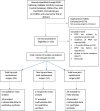Factors associated with persistent postsurgical pain after total knee or hip joint replacement: a systematic review and meta-analysis
- PMID: 36699992
- PMCID: PMC9833456
- DOI: 10.1097/PR9.0000000000001052
Factors associated with persistent postsurgical pain after total knee or hip joint replacement: a systematic review and meta-analysis
Abstract
Studies have identified demographic, clinical, psychosocial, and perioperative variables associated with persistent pain after a variety of surgeries. This study aimed to perform a systematic review and meta-analysis of factors associated with persistent pain after total knee replacement (TKR) and total hip replacement (THR) surgeries. To meet the inclusion criteria, studies were required to assess variables before or at the time of surgery, include a persistent postsurgical pain (PPSP) outcome measure at least 2 months after a TKR or THR surgery, and include a statistical analysis of the effect of the risk factor(s) on the outcome measure. Outcomes from studies implementing univariate and multivariable statistical models were analyzed separately. Where possible, data from univariate analyses on the same factors were combined in a meta-analysis. Eighty-one studies involving 171,354 patients were included in the review. Because of the heterogeneity of assessment methods, only 44% of the studies allowed meaningful meta-analysis. In meta-analyses, state anxiety (but not trait anxiety) scores and higher depression scores on the Beck Depression Inventory were associated with an increased risk of PPSP after TKR. In the qualitative summary of multivariable analyses, higher preoperative pain scores were associated with PPSP after TKR or THR. This review systematically assessed factors associated with an increased risk of PPSP after TKR and THR and highlights current knowledge gaps that can be addressed by future research.
Keywords: Chronic postsurgical pain; Hip replacement; Knee replacement; Meta-analysis; Persistent postsurgical pain; Systematic review.
Copyright © 2023 The Author(s). Published by Wolters Kluwer Health, Inc. on behalf of The International Association for the Study of Pain.
Conflict of interest statement
S. Haroutounian reports research grants from Disarm Therapeutics and personal fees from Rafa Laboratories and Vertex Pharmaceuticals, outside the scope of this paper. The remaining authors have no conflicts of interest to declare.Sponsorships or competing interests that may be relevant to content are disclosed at the end of this article.
Figures








References
-
- Albayrak S, Erkocak OF, Kavalci H, Ozerbil OM, Levendoglu FIA. Total knee arthroplasty due to knee osteoarthritis: risk factors for persistent postsurgical pain. J Natl Med Assoc 2016;108:236–43. - PubMed
-
- Aso K, Ikeuchi M, Takaya S, Sugimura N, Izumi M, Wada H, Okanoue Y, Dan J. Chronic postsurgical pain after total knee arthroplasty: a prospective cohort study in Japanese population. Mod Rheumatol 2021;31:1038–44. - PubMed
-
- Attal A, Martinez V, Jayr C, Albi A, Fermanian J, Bouhassira D, Baudic SNM-D. Does cognitive functioning predict chronic pain? Results from a prospective surgical cohort. Brain 2014;137:904–17. - PubMed
-
- Aveline AL, Hetet HL, Gautier JF, Vautier P, Cognet F, Bonnet FCR. Pain and recovery after total knee arthroplasty: a 12-month follow-up after a prospective randomized study evaluating nefopam and ketamine for early rehabilitation. Clin J Pain 2014;30:749–54. - PubMed
-
- Misha BackonjaM, Attal N, Baron R, Bouhassira D, Drangholt M, Dyck PJ, Edwards RR, Freeman R, Gracely R, Haanpaa MH, Hansson P, Hatem SM, Krumova EK, Jensen TS, Maier C, Mick G, Rice AS, Rolke R, Treede RD, Serra J, Toelle T, Tugnoli V, Walk D, Walalce MS, Ware M, Yarnitsky D, Ziegler D. Value of quantitative sensory testing in neurological and pain disorders: NeuPSIG consensus. PAIN 2013;154:1807–19. - PubMed
Publication types
LinkOut - more resources
Full Text Sources
